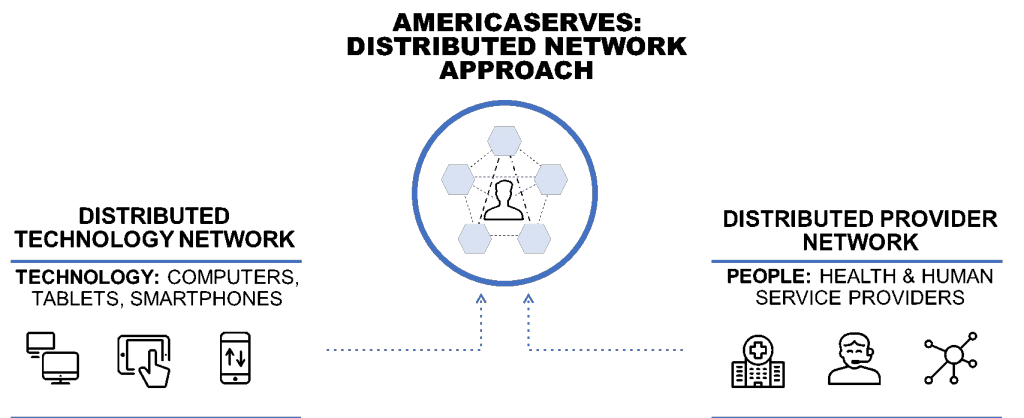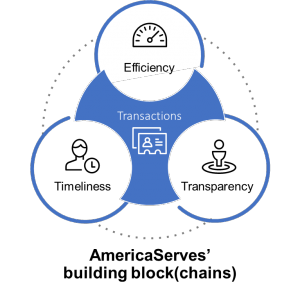By Jim McDonough, IVMF, Dan Brillman, Unite US, & Maggie Pollard, Accenture Federal Services
In a recently-penned LinkedIn post, Sam Caplan, Director of Technology and Data for the Walmart Foundation, posits that Blockchain, an emerging technology is “…gaining popularity in many industries as a mechanism for recording transactions (data) in a virtual ledger, across a distributed network of computers, using cryptography to protect the data and prevent tampering.”
What is blockchain? Most simply, blockchain is a database that maintains a continuously growing list of data records or transactions. While most individuals associate blockchain with financial transactions, forward thinking companies like Walmart have evolved the technology beyond its original application. In Walmart’s case, to track each step of food production along the supply chain in hopes that doing so will increase efficiency, timeliness, and transparency.
We’ve used these words a lot lately ourselves as they have similar underpinnings related to the work associated with Syracuse University’s Institute for Veterans and Military Families’ (IVMF’s) AmericaServes initiative supporting emerging health and human service delivery models to improve care for America’s military service members, veterans, and their families. As is the case with the grocer that donates food to Feeding America in Caplan’s analogy, every time a transaction involving that donation moves from donation point to a hungry American family, the opportunity exists to not only understand what that journey looks like, but to also improve upon the journey of that donated item.
Similarly, that opportunity exists within the delivery of human services to record every unique transaction across a distributed network of health and human service providers – service episodes, in AmericaServes speak. The result can accelerate the impact of an intervention and improve client outcomes long after service delivery ends. By focusing on transactional improvements – such as how long (timeliness) it takes to navigate a client to the right (efficient) service provider – we can not only reimagine the way that individuals are served in the health and human services spectrum, we can literally now be transparent about it as well.
 In AmericaServes, a distributed network of computers, tablets, and smartphones are paired with service, care, and resource providers. Health and human service providers enter clients who present multiple needs that are beyond their organization’s service offering to other, known network providers who then address the same client’s needs within their service purview. Consider this scenario: a veteran reaches out to a housing provider for assistance with rapid re-housing. During the intake with the housing provider, the veteran discloses that they have been unable to find permanent housing due to job instability. Wanting to ensure that the full spectrum of needs that the veteran presents are addressed, the housing provider obtains the veterans consent to refer them into a known network of providers, including those that can provide employment assistance. Once entered into the distributed network with a permission-based master index, each transaction (service episode), like links in a chain, are digitally recorded, timestamped, and added to the veteran’s master record, empowering the initial housing provider with real-time feedback on the veteran’s journey through multiple services across their community.
In AmericaServes, a distributed network of computers, tablets, and smartphones are paired with service, care, and resource providers. Health and human service providers enter clients who present multiple needs that are beyond their organization’s service offering to other, known network providers who then address the same client’s needs within their service purview. Consider this scenario: a veteran reaches out to a housing provider for assistance with rapid re-housing. During the intake with the housing provider, the veteran discloses that they have been unable to find permanent housing due to job instability. Wanting to ensure that the full spectrum of needs that the veteran presents are addressed, the housing provider obtains the veterans consent to refer them into a known network of providers, including those that can provide employment assistance. Once entered into the distributed network with a permission-based master index, each transaction (service episode), like links in a chain, are digitally recorded, timestamped, and added to the veteran’s master record, empowering the initial housing provider with real-time feedback on the veteran’s journey through multiple services across their community.
The premise of blockchain – breaking down something as complex into transactional records that allow for improvements in efficiency, timeliness and transparency at every step – has become central to our AmericaServes’ communities. Because every transaction associated with a client carries a unique timestamp, we can now present a comprehensive record and complete view that provides community insights into how service episodes are addressed across a multitude of agencies.
Using blockchain’ s unblocking logic, the idea is that no one organization is capable of addressing everyone’s unique needs, so why not digitally unlock the power of all providers to participate and record their specific contribution to making people’s lives better? Each contribution made by providers involves a recorded transaction of a specific service episode that continuously builds upon the client’s accountable journey to improved health. Like the tracking of food donations throughout their journey to feed hungry American families, tracking individuals throughout their journey to access health and human services provides unprecedented opportunity to transactionally dissect these complex systems of care, and ultimately, introduce new foundational technology for human service provision.
As is the case with blockchain, AmericaServes’ comprehensive networks of community-based resources, services and care ‘ride’ a wave of distributed technology powered by Unite US that can be grouped together in a cryptographically protected block with other transactions that have occurred previously and made available to other providers operating within the network through a series of PII and HIPAA approved permissions. Simply put, AmericaServes communities trace service episodes longitudinally in a continuum, from beginning to end, no matter where, when, and how they originate and close.
 As articulated in Harvard Business Review’s The Truth About Blockchain, we appreciate that AmericaServes is not introducing ‘disruptive technology’ into our communities, but rather ‘foundational technology’ with an ability to create new infrastructure for social systems. With ‘foundational technology’ like AmericaServes comes ‘gradual and steady adoption, not sudden,’ as we focus on small gains to introduce change management and increase provider use. Because we’re fundamentally changing the way that service provision occurs – and has occurred for over a century in communities – we must be patient, deliberate, and precise. In addition to demonstrating how the foundational technology that underpins AmericaServes increases efficiency and timeliness, we’re also transparent about what these transactions yield. For example, participating providers are able to gain deeper insights into the clients that they serve and their social determinants. On a quarterly basis, we present real-time data on how long it takes to refer a client, make a positive match to a provider that can serve their needs, and outcomes associated with closing each service episode.
As articulated in Harvard Business Review’s The Truth About Blockchain, we appreciate that AmericaServes is not introducing ‘disruptive technology’ into our communities, but rather ‘foundational technology’ with an ability to create new infrastructure for social systems. With ‘foundational technology’ like AmericaServes comes ‘gradual and steady adoption, not sudden,’ as we focus on small gains to introduce change management and increase provider use. Because we’re fundamentally changing the way that service provision occurs – and has occurred for over a century in communities – we must be patient, deliberate, and precise. In addition to demonstrating how the foundational technology that underpins AmericaServes increases efficiency and timeliness, we’re also transparent about what these transactions yield. For example, participating providers are able to gain deeper insights into the clients that they serve and their social determinants. On a quarterly basis, we present real-time data on how long it takes to refer a client, make a positive match to a provider that can serve their needs, and outcomes associated with closing each service episode.
IVMF is aided in this health and human service delivery revolution through strong partnerships with our technology provider, Unite US and the global professional services firm, Accenture. Through Unite US’ vision to introduce efficiency, timeliness, and transparency for networked health and human service providers and Accenture’s endeavor to be at the forefront of blockchain in its practical, real world application, we’re not only optimistic that we can deliver innovative building block(chain) solutions to our communities to improve service delivery for veterans, service members, and their families, we’re equally optimistic about its potential for human services more broadly.
